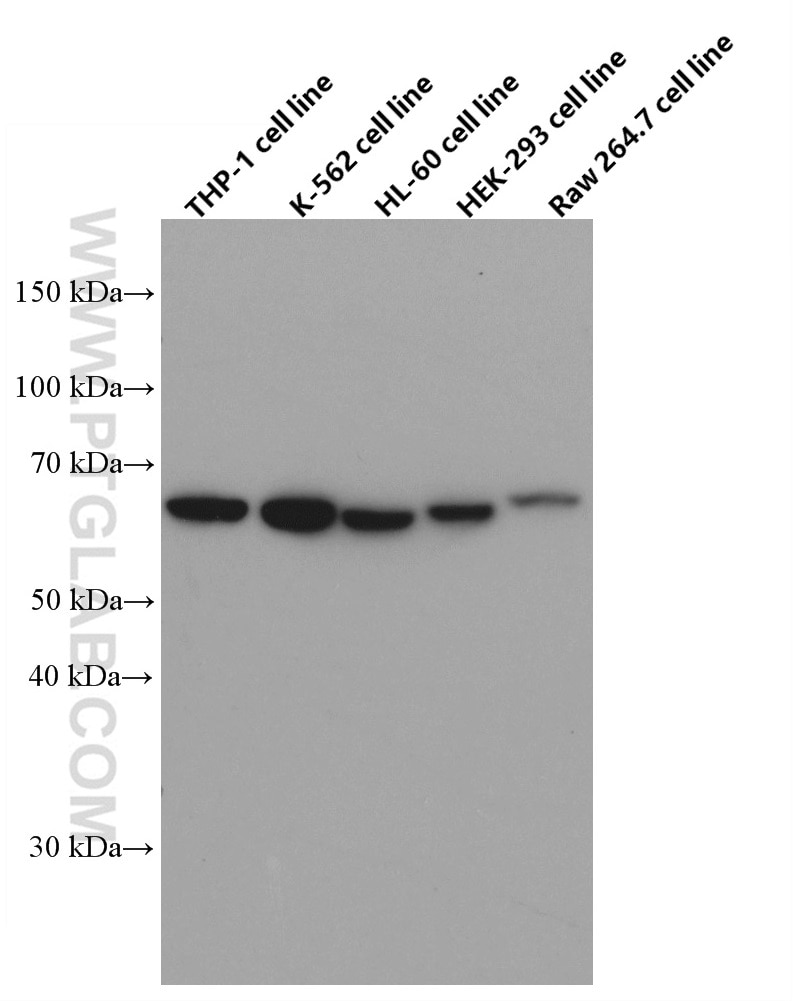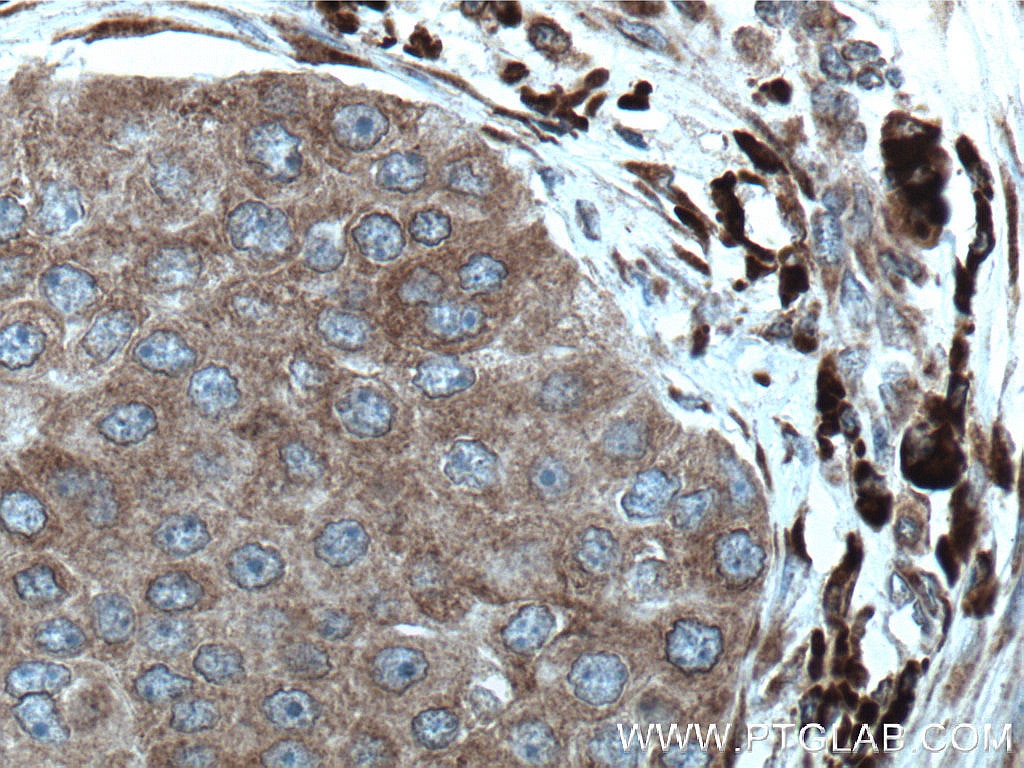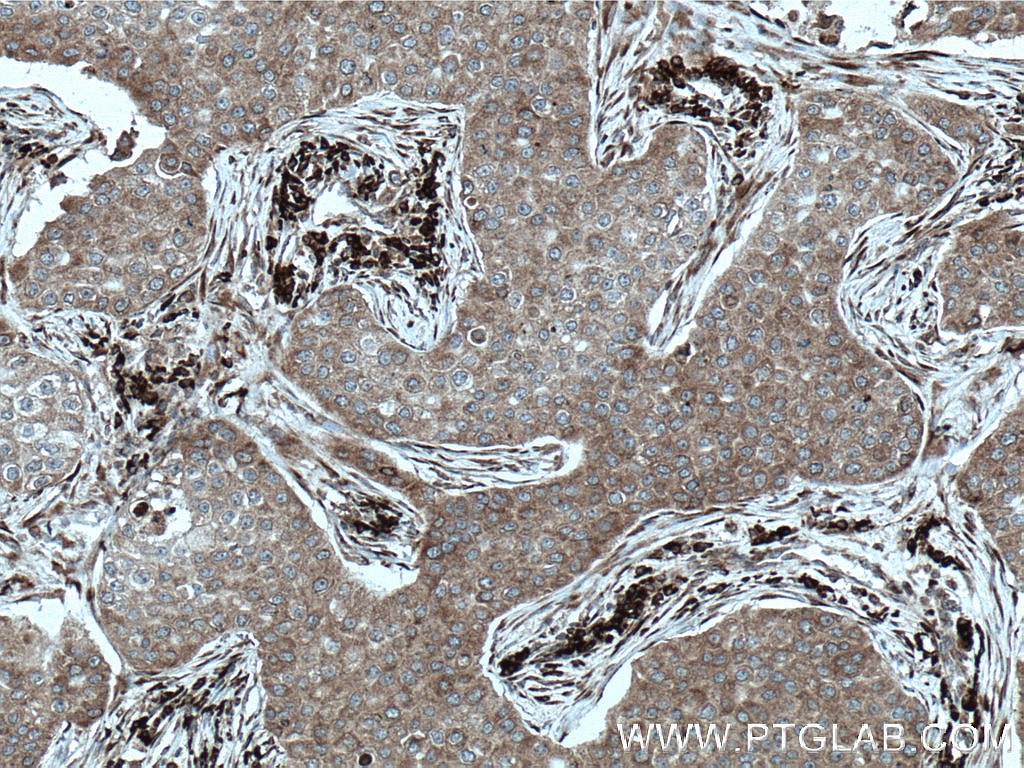- Phare
- Validé par KD/KO
Anticorps Monoclonal anti-STT3A
STT3A Monoclonal Antibody for WB, IHC, ELISA
Hôte / Isotype
Mouse / IgG1
Réactivité testée
Humain, rat, souris
Applications
WB, IHC, IF, ELISA
Conjugaison
Non conjugué
CloneNo.
1E2B12
N° de cat : 66581-1-Ig
Synonymes
Galerie de données de validation
Applications testées
| Résultats positifs en WB | cellules THP-1, cellules HEK-293, cellules HL-60, cellules K-562, cellules RAW 264.7 |
| Résultats positifs en IHC | tissu de cancer du sein humain, il est suggéré de démasquer l'antigène avec un tampon de TE buffer pH 9.0; (*) À défaut, 'le démasquage de l'antigène peut être 'effectué avec un tampon citrate pH 6,0. |
Dilution recommandée
| Application | Dilution |
|---|---|
| Western Blot (WB) | WB : 1:1000-1:6000 |
| Immunohistochimie (IHC) | IHC : 1:50-1:500 |
| It is recommended that this reagent should be titrated in each testing system to obtain optimal results. | |
| Sample-dependent, check data in validation data gallery | |
Applications publiées
| KD/KO | See 1 publications below |
| WB | See 2 publications below |
| IHC | See 2 publications below |
| IF | See 2 publications below |
Informations sur le produit
66581-1-Ig cible STT3A dans les applications de WB, IHC, IF, ELISA et montre une réactivité avec des échantillons Humain, rat, souris
| Réactivité | Humain, rat, souris |
| Réactivité citée | Humain |
| Hôte / Isotype | Mouse / IgG1 |
| Clonalité | Monoclonal |
| Type | Anticorps |
| Immunogène | STT3A Protéine recombinante Ag27072 |
| Nom complet | STT3, subunit of the oligosaccharyltransferase complex, homolog A (S. cerevisiae) |
| Masse moléculaire calculée | 705 aa, 81 kDa |
| Poids moléculaire observé | 65 kDa |
| Numéro d’acquisition GenBank | BC020965 |
| Symbole du gène | STT3A |
| Identification du gène (NCBI) | 3703 |
| Conjugaison | Non conjugué |
| Forme | Liquide |
| Méthode de purification | Purification par protéine G |
| Tampon de stockage | PBS with 0.02% sodium azide and 50% glycerol |
| Conditions de stockage | Stocker à -20°C. Stable pendant un an après l'expédition. L'aliquotage n'est pas nécessaire pour le stockage à -20oC Les 20ul contiennent 0,1% de BSA. |
Informations générales
STT3A, also named as Integral membrane protein 1, belongs to the STT3 family. STT3A is expressed at high levels in placenta, liver, muscle and pancreas, and at very low levels in brain, lung and kidney. STT3A is a catalytic subunit of the N-oligosaccharyl transferase (OST) complex which catalyzes the transfer of a high mannose oligosaccharide from a lipid-linked oligosaccharide donor to an asparagine residue within an Asn-X-Ser/Thr consensus motif in nascent polypeptide chains. STT3A is present in the majority of OST complexes and mediates cotranslational N-glycosylation of most sites on target proteins, while STT3B-containing complexes are required for efficient post-translational glycosylation and mediate glycosylation of sites that have been skipped by STT3A. There are two isoforms of STT3A with molecular weight of 81 and 70 kDa. 66581-1-Ig antibody detects a protein around 65-70 kDa in SDS-PAGE which is similar to papers published. (PMID: 32005703, 25135935)
Protocole
| Product Specific Protocols | |
|---|---|
| WB protocol for STT3A antibody 66581-1-Ig | Download protocol |
| IHC protocol for STT3A antibody 66581-1-Ig | Download protocol |
| Standard Protocols | |
|---|---|
| Click here to view our Standard Protocols |
Publications
| Species | Application | Title |
|---|---|---|
Transl Lung Cancer Res Targeting STT3A produces an anti-tumor effect in lung adenocarcinoma by blocking the MAPK and PI3K/AKT signaling pathway. | ||
Front Immunol Analysis of Tumor Glycosylation Characteristics and Implications for Immune Checkpoint Inhibitor's Efficacy for Breast Cancer. | ||
Cancer Lett Pharmacological suppression of HHLA2 glycosylation restores anti-tumor immunity in colorectal cancer | ||
Adv Sci (Weinh) N-glycosylation Modification of CTSD Affects Liver Metastases in Colorectal Cancer
|




